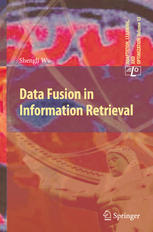

Most ebook files are in PDF format, so you can easily read them using various software such as Foxit Reader or directly on the Google Chrome browser.
Some ebook files are released by publishers in other formats such as .awz, .mobi, .epub, .fb2, etc. You may need to install specific software to read these formats on mobile/PC, such as Calibre.
Please read the tutorial at this link: https://ebookbell.com/faq
We offer FREE conversion to the popular formats you request; however, this may take some time. Therefore, right after payment, please email us, and we will try to provide the service as quickly as possible.
For some exceptional file formats or broken links (if any), please refrain from opening any disputes. Instead, email us first, and we will try to assist within a maximum of 6 hours.
EbookBell Team

0.0
0 reviewsThe technique of data fusion has been used extensively in information retrieval due to the complexity and diversity of tasks involved such as web and social networks, legal, enterprise, and many others. This book presents both a theoretical and empirical approach to data fusion. Several typical data fusion algorithms are discussed, analyzed and evaluated. A reader will find answers to the following questions, among others:
What are the key factors that affect the performance of data fusion algorithms significantly?
What conditions are favorable to data fusion algorithms?
CombSum and CombMNZ, which one is better? and why?
What is the rationale of using the linear combination method?
How can the best fusion option be found under any given circumstances?